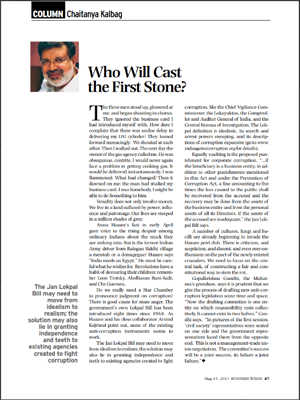WHO WILL CAST THE FIRST STONE?
[Business Today]
Published date: 15th May 2011
The Jan Lokpal Bill may need to move from idealism to realism; the solution may also lie in granting independence and teeth to existing agencies created to fight corruption.
The three men stood up, glowered at me, and began shouting in chorus. They ignored the business card I had introduced myself with. How dare i complain that there was undue delay in delivering my LPG cylinder? They leaned forward menacingly. We shouted at each other. Then i walked out. The next day the owner of the gas agency called me. He was obsequious, contrite. i would never again face a problem in getting cooking gas. It would be delivered instantaneously. i was flummoxed. What had changed? Then it dawned on me: the man had studied my business card. i was somebody. i might be able to do something to him.
Venality does not only involve money. We live in a land suffused by power, influence and patronage. our lives are steeped in a million shades of grey.
Anna Hazare’s fast in early April gave voice to the rising despair among ordinary Indians about the muck they are sinking into. But is the former Indian army driver from Ralegan Siddhi village a messiah or a demagogue? Hazare says “India needs an Egypt.” He must be careful what he wishes for. Revolutions have a habit of devouring their children; remember Leon Trotsky, Abolhasan Bani-sadr, and Che Guevara.
Do we really need a star Chamber to pronounce judgment on corruption? There is good cause for mass anger. The government’s own Lokpal Bill has been introduced eight times since 1968. As Hazare and his close collaborator Arvind Kejriwal point out, none of the existing anti-corruption instruments seems to work.
The Jan Lokpal Bill may need to move from idealism to realism; the solution may also lie in granting independence and teeth to existing agencies created to fight corruption, like the Chief Vigilance Commissioner, The Lokayuktas, the Comptroller and auditor General of India, and the Central Bureau of investigation. The Lok-pal definition is idealistic, its search and arrest powers sweeping, and its descriptions of corruption expansive .
Equally vaulting is the proposed punishment for corporate corruption. “…if the beneficiary is a business entity, in addition to other punishments mentioned in this act and under the Prevention of Corruption act, a fine amounting to five times the loss caused to the public shall be recovered from the accused and the recovery may be done from the assets of the business entity and from the personal assets of all its directors, if the assets of the accused are inadequate,” the Jan Lok- pal Bill says.
A number of cultures, fungi and bacilli are already beginning to invade the Hazare petri dish. There is criticism, and scepticism, and dissent, and even over-enthusiasm on the part of the newly-minted crusaders. We need to focus on the central task, of constructing a fair and constitutional way to stem the rot.
Gopalkrishna Gandhi, the Mahatma’s grandson, says it is prudent that we give the process of drafting new anti-corruption legislation some time and space. “now the drafting committee is one entity on which responsibility rests collectively. it cannot exist in two halves,” Gandhi says. “in pictures of the first session, ‘civil society’ representatives were seated on one side and the government representatives faced them from the opposite end. this is not a management-trade un- ion negotiation. The committee’s success will be a joint success, its failure a joint failure.”






